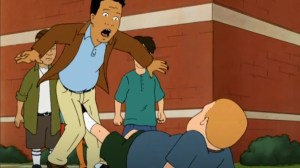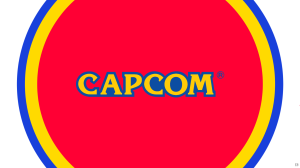As the final day of Ronald Wimberly’s crowdfunding campaign for Gratuitous Ninja winds down, fans have their last chance to pick up the elaborate, 600-page graphic novel and all the other goodies associated with the Kickstarter campaign. The challenges of finding a way to bring a webcomic, originally designed to play on an infinite scroll, into the physical realm have created some cool, strange, and exciting presentation methods, but the unique design aesthetic sent Wimberly to crowdfunding, where he could presell the books in advance of their planned March 2023 release date.
Videos by ComicBook.com
Ahead of the campaign’s end, acclaimed comics writer Kelly Due DeConnick spoke with Wimberly about the project, including their broader views on life and art, some of the experiences that shaped them as artists, and what kind of challenges draw them in.
ComicBook was there to observe and take notes, but did not directly take part, so special thanks to Deconnick, Wimberly, and Beehive Books for making this happen. The chat ran for over two hours, so even at three parts, this is modified for brevity.
You can read the last portion of the three-part conversation between Wimberly and DeConnick below. You can also check out part one here and part two here.
Kelly Sue DeConnick: As a writer, conventions are a money loser. I will take some books to sell if I have books to sell, but I don’t like to do it anymore. I used to do it.
Ronald Wimberly: Speaking as someone who’s lazy, I also find that they are money-losing. I’m not going to be sitting here like Jim Mahfood, drawing, you know what I mean? That guy’s there making art. I’m shy even drawing in front of people, so forget about it. I’m not Sienkiewicz out here, just like pencil genius — “Okay. There’s $300.”
DeConnick: Yeah. One time I was sitting on the bus with him. He did a drawing, and then was going to throw it away. And I was like, “Um, excuse me…I’m just gonna…is it okay if I just — ?”
But, anyway, I tell myself that the reason I do the shows is to be able to interact with readers and say “thank you for giving me the opportunity to make my living this way.” I think just as much, if not more, is the fact that I work in my house. I leave my house to go to the grocery store and to take my kids to school, and that’s kinda it. And even though I think Twitter is both bad for me and culture, I’m on it, because that’s most of who I talk to, that I’m not related to, you know?
Wimberly: They got you. They got us!
DeConnick: I know. The worst. But I think that these conversations that we have with other artists and other creators are food. I think we’re really hungry in the pandemic for conversations, and sick of our own voices, and so, yeah, we’re going to be like, “Here’s what I’ve been thinking about. I’m really interested in tragedy and complexity right now…”
Wimberly: Is that true facts? Is that where you’re at right now?
DeConnick: That is actually true facts, yeah.
Wimberly: Where did that come from?
DeConnick: Just the moment. I think the complexity part came from, I’m 50 and I think the older I get, the more complex everything reveals itself to be. And I think that’s developmentally appropriate. I think in order for us to be the engines, and the drivers, and the doers that we need to be in youth — because youth has to advance culture — it is necessary for us to subscribe to some oversimplifications to get that kitchen moving. But I think, as you get older and that is no longer your role, your brain doesn’t hide the complexity, or dismiss it the way it used to.
Wimberly: You’ve got a lot more data, too.
DeConnick: There’s that, as well. I was a weird child, as we all were in our own ways, but my way was that I read Greek theatre in third and fourth grade, and was really drawn to ancient literature. I liked the drama of it, but I resented the lack of an opportunity for a happy ending. There was something about tragedy that didn’t resonate with me as a child, that as I have grown older and had more data, I have come to see that you can’t Kobayashi Maru everything. Do you know what that is?
Wimberly: No. It sounds familiar, though.
DeConnick: It’s a Star Trek reference. Kirk is given a no-win scenario. It’s called the Kobayashi Maru.
Wimberly: Ah, yeah, okay, okay.
DeConnick: And it’s a test for potential ship captains. It’s a no win scenario, so it’s like, how will you handle it? I don’t think there’s a right or a wrong answer for that, but it’s an understanding of the no-win scenario, and he f—ing sheets. He hacks it so that there is a win, right? And I think we’re supposed to be like, “Ha! He’s a real…!” But that’s not the world. There are no-win scenarios.
This is a Martha Nussbaum thing, but maybe you’re not going to have to choose between sacrificing your daughter or sacrificing your army. But you are going to have to choose between being at your daughter’s opening night of her production, or being at the conference that your boss really wants you to be at, to get this client that your company really needs. There’s smaller stakes…
Wimberly: But then you have that position, and that gives you the money to send your daughter to a school where she can have this.
DeConnick: Exactly. There are no-win situations, and the stakes are very different. Sometimes there’s a no-win situation where you need to do the right thing for your values, but it puts people you care about into a position of not being happy with you. Or it costs them something. That is the world. So, I’m very interested in how we navigate tragedy, and who we are in no-win situations. Not cheating, but living in the discomfort of it, and understanding that life isn’t a game that you win. That’s a thing I am genuinely interested in very much right now.
Wimberly: Well, I’m sure things will continue to come out of that. I’m sure that’s going to be an everything, right?
DeConnick: Yes. It is kind of in everything, Most pointedly, the Wonder Woman comic I’m doing right now, isn’t really a Wonder Woman comic. I wanted to do a Homerian epic with a woman at the center. So, it’s Hippolyta’s story. But if you’ve read Homer, you know that Homer’s heroes are not perfect people, and they don’t have happy endings. So she does some painful and heinous things.
Wimberly: I saw something the other day. That’s making me, that’s triggering this for some reason. This conversation is making me think about it. I Greenaway’s film. The Cook, the Thief, His Wife and Her Lover. I had only seen The Draughtsman’s Contract and Prospero’s Books. But this was very Greek. I don’t know if you’ve seen it.
DeConnick: I’ve seen it, but I haven’t seen it literally since it came out. I barely remember it. Interestingly enough, I remember that I worked in the video store when it came out.
Wimberly: Where were you?
DeConnick: Austin, Texas.
Wimberly: Was it hip back then? It must have been. You were in the video store!
Deconnick: I mean, I worked in the video store that was catty corner from my high school for four years — two years of high school and two years of college, I worked there, and that place was f—ed up. I think back on that now and I would close the store by myself at midnight when I was like 16. I was a little smart ass kid, and we rented adult films, and I would read the titles of the films out loud to people as they were checking out, just like, “Okay, so that’ll be like RoboCop and Gangbang 4.”
And one of the guys I worked with was a heroin addict. He would come in and shoot up in our bathroom, and he would just be in there for hours while I was running the store. Then it would be time to close, and it’s like, “I sure hope he’s not dead in there!” It’s just the stuff that somehow just seemed like, “Oh, this is the wacky times we live in!” Now I look back at it, and I’m like, Jesus f—ing Christ.
Wimberly: That’s how it works. You get some distance.
DeConnick: We should come back to this list. For people who are really new to your stuff: Did you always know you were going to be a cartoonist?
Wimberly: Um, I still don’t know that. [laughs]
I guess, depending on when you ask me — or if you ask my mom even — I think my epistemic practice will reveal itself in how I answer the question. I think it was the thing I had, that I could do, that I was exceptional at, was creative things. Right. So I think that’s how I wound up doing it. Then when I was in high school, and the market’s getting a preview of how you’re going to fit into it, it was like “Okay, you have high scores in your literature courses and your art. You’re obviously gifted by all the drawings that you leave in your books and on the corners of your homework. So your moonshot is probably art school.”
That’s how I ended up at art school. I think I’ve always been drawn to creative endeavors. I used to sculpt, and I like drawing, and so on and so forth, since I was very young. Lots of reading, lots of writing, you know what I mean? And I wound up there because I could sell my labor for more in that way than I could folding clothes, or selling a Walkman at Circuit City.
And I’m also kind of…probably the teachers would say strong-willed, you know what I mean? And I think I have risky behaviors, and being an artist is risky. I look at my aunt, my uncles and aunts, and like some of the people who had their own tragic endings, and I’m just like them. Being an artist being an artist is it’s not like something you reasonably say like, “That’s a way to live. That’ll be easy.” I think some people are naive in the sense that they maybe don’t see how much of a gamble it can be. I think there are ways that it can be less of a gamble, but, for me, I just always saw it as the only way that I could do it. I would fail at doing anything else, going into work someplace. I don’t have it in me. I’m essentiall on my mother’s and my stepdad’s shoulders. The work that they did got me here. I’m not strong enough to do that type of thing. I think when I really started to appreciate my stepdad, and love my stepdad, is when I got to the age where I was like, wow, this motherfucker was going to like two jobs, and so was my mom, So four jobs between them or something, and on the holidays getting that little extra retail job, to send me and my sister’s ass to school. Like, the son of someone he don’t even like, you know what I mean? I was like, “Wow, that is a type of character that I don’t have,.” Or I have not been made to show that I have it. So I think that’s, long story long, how I ended up being an artist. And I like to tell stories.
DeConnick: I think it’s the job of the artist to go where we’re not safe. When I’m thinking about a new project, I’ll think, is this a thing I should pursue? Because if I take this on, it’s going to be years of my life. Also like at my age — and this is true at any age, but you feel it at my age — it’s like, I have a limited number of books left. Do I want to spend one on this? And it’s interesting because even though, at this point in my life, I have more to lose — and I’m more risk averse in some other ways — the more frightened I am of something, and the more intimidated I am by something, the more I know that’s the direction I have to get. That’s the way.
Wimberly: It’s that Bowie quote, right? About walking out in the water. He says something like, “When you’re making art, it’s like you’re out in the ocean, and when you get to that distance where your feet aren’t quite touching the bottom anymore, that’s when art happens.”
DeConnick: What comics and comics creators were most impactful on you, as you developed your storytelling style?
Wimberly: Oh, I love this. I love this, because recently I’ve been getting more into it again. Talking about problematic faves, Slow Jams was great, David Choe’s Slow Jams was like very important and formative for me. Ripple by Dave Cooper, and also Pat McCallum’s No Way Out comic that he put in that little book. Paul Pope’s THB was big. Hugo Pratt, mostly his drawings, not even necessarily the comics. Moebius’s Arzach. That’s about it. A lot of manga, like Otomo’s Domu. A little later it was Tekkonkinkreet. I was already in college when I came upon that, but definitely Tekkonkinkreet.
A lot of those other artists, one of the things that they did for me was, you walk past a wall of like Marvel and DC and people have got their boxes full of them. And then you see these books, and you don’t know how hard it is. You don’t know that Jessica Abel is just making it for the love. You just see you just see this little comic and you’re like, “Wow, she’s doing it.” And it’s like, you know what? I can do this. There’s gotta be money in this, because who would do this and starve to death? Little did I know.
So I think looking at those images, and those pictures, I’m like, “Man, Ripple and all of Dave Cooper’s early comics were just so f—ed up and weird.
DeConnick: What was the one of his, that was the building that you could read?
Wimberly: That’s Pat McCallum. That’s No Way Out, but it’s in Dave Cooper’s comic. It was published in Ripple. And it’s crazy because I reached out to Patrick like two days ago. I reached out to him just to let him know, like yo, that comic was really important for me.
DeConnick: I must have read that at least 15 years ago, and I still…I clearly didn’t remember who did it, but I remember the comic and I remember just being like, “F—ing, how did you…?” Like, Sondheim talks about writing as puzzle solving, and boy, you built an exquisite puzzle for yourself, and then solved it. And then like, holy s—t.
Wimberly: I feel something like that. I was on Cartoonist Kayfabe talking to Jim about, Aeon Flux, and I think Aeon Flux was something that definitely just blew my whole mind out when I was a kid, watching Liquid Television.
DeConnick: I can see that in your line. I mean like that, that is maybe one of the few literal visual influences that I can see.
Wimberly: Yeah. Well, here’s, here’s what I chalk it up to — something maybe even a little bit older than that is, one Christmas, we had kind of a scarce Christmas. My grandma — and this is something that I even struggled with politically; maybe it’s a colonized mind, but like I’m really into classical forms and shapes. And my grandma gave me this drawing book, and it had these classical heads in it. Right. And I think when I saw Aeon Flux, one of the things that really struck out to me was just like the drawing that was somewhere between a classical look and Sheila or something, you know what I mean? Like, it’s, it’s a combination, those two things. I was on that path, and I feel like, when that hit, it was like a giant wave that I’m probably still on, and totally shaped the way I thought about probably even pictorial space. The way he’s moving things around, and the camera. As an animator, he’s using the camera in very interesting ways. But also conceptually, in Aeon Flux, in every one of those short she dies, and yet there she is again on the, in the next one.
What is she doing? What is it she’s trying to look at? What is she trying to achieve? And that’s the puzzle. I think for me, it was a way for my mind to kind of just think, and to wonder about things. I think art as a space for you to ponder, like a space for your brains just to imagine…I think that was super formative.
So when I finally got to comics, that’s how I’m thinking about comics. No Escape, probably it slides right into that zone. Even the X-Men comics that I would get where would say — and this is a device I use as a formal device; I don’t even have the extra issues, but like in GratNin, in when it says, “see issue whatever,” — I’m thinking about storytelling. The issue doesn’t exist, but that’s a space for you to think about what that could mean, or what world this comic book exists in.
I think a lot of that started out with…yes, with Aeon Flux, but just also the way that I connected to a lot of these things growing up, which was piecemeal. My homie’s mom would take us to the comic book store to get comics. My folks wasn’t taken me to a comic book store. So, so like I could never keep up on all the stories. I would read most of the stories on the back of the cards. That’s why there’s trading cards in GratNin. Cause like, to me, that’s part of the storytelling. It’s like, you’re piecing it together. It’s like, “When is Dragon Ball coming on, even? I don’t know. When does Robotech come on?” Maybe your cousin’s got the TV, so you’re not going to get to see that, so you’re piecing these stories together. You’re given a platform – a single episode is just a space for your imagination to jump in and think about what is happening. Like, who is Mumm-Ra? I don’t know who Mumm-Ra is; I haven’t seen the whole thing, but that’s a crazy thing to think about this guy. Like, what’s the story? I’m more interested in that.
I think that’s why I probably won’t make any super long works again. That, and what you said before: it’s such a commitment. Maybe I will, I don’t know. I’m more interested in the suggestion, and the space. You’re looking at a Velasquez or something, and you see this sort of a mythical motif, or a Davi, like, why does he have all the swords? That’s a whole story there in an image, and I’m interested in film, comics, animation, even music that, that does that.









